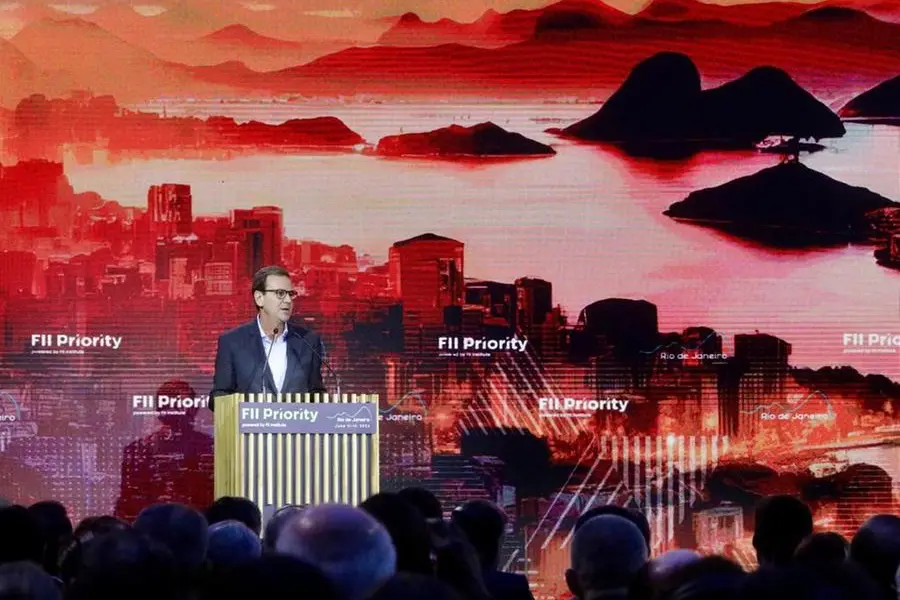PHOTO
RIO DE JANEIRO - As the host of the upcoming G20 Leaders' Summit on November 18-19, 2024, Rio de Janeiro's Mayor, Eduardo Paes, emphasised the city's preparedness for the event in an interview with the Emirates News Agency (WAM) at the FII Priority Summit 2024. He highlighted Rio's experience in hosting major events.
"Having hosted the Olympics in 2016, Rio de Janeiro is no stranger to large-scale events. While the G20 Summit is undoubtedly significant, it's a single-venue gathering. Rio stands ready to showcase its full potential and all its unique charm to the world."
Brazil has held the rotating G20 presidency since December 2023. More than one hundred G20-related events are planned in the country, with Rio hosting several meetings before the Leaders' Summit on 18–19 November 2024. The Brazilian presidency will end on November 30, 2024, when South Africa will assume it.
For Paes, Rio de Janeiro represents what people imagine of Brazil around the world. “Historically, whenever one thinks of Brazil, one thinks of Rio and wants to come to Rio. I think President Lula understands this very well, and it is no wonder he chose Rio to be the capital of the G20,” said Paes.
The G20 spirit is already palpable in Rio de Janeiro. The city is abuzz with preparations, as seen in the banners adorning the City Palace and City Hall, the new mural at the City of Arts, and signage installed on the iconic Copacabana beach. These are just a few examples of the many interventions underway.
Lucas Padilha, President of the G20 Committee of Rio de Janeiro and International Relations and Cooperation Coordinator of the City Hall, reassured that the local authorities are taking care of the infrastructure -- taking the G20 to downtown Rio. "President Lula understood how important it was for the mayor to hold a G20 that would show that Rio de Janeiro is the centre of Brazil, the historical centre, the logistical centre too; I mean, there's no reason for us to hide this magnitude of event anywhere else. We're going to hold it downtown, close to an area with much infrastructure."
Rio's G20 strategy extends beyond the summit itself, encompassing year-long efforts. This includes infrastructure upgrades, street renewals, and the renovation of the Modern Art Museum – the chosen venue for the event. Additionally, the city is focusing on enhancing its hospitality sector to provide a unique experience for guests.
Regarding safety, Lucas Padilha said that Rio de Janeiro is prioritising public safety. The city, he said, recently launched the Intelligence, Surveillance and Technology Support Center, a comprehensive monitoring system to enhance security. Additionally, the number of security guards has more than doubled, from 3,000 to 8,000, with improved training since Mayor Paes took office.
Rio & UAE
Rio's Mayor also praised the UAE's position in Brazil. "We look at the United Arab Emirates as a great partner", said Paes. Classifying Dubai and Abu Dhabi as global cities, the Mayor expressed that their vision offers exchange opportunities.
Eduardo Paes, who participated in COP28, also highlighted the importance of seeing a country like the UAE address environmental challenges. “All of this is very important, so it was an incredible experience,” concluded Paes, who is leading the polls to be re-elected as Mayor of Rio de Janeiro in the upcoming municipal elections next October.
In addition to its infrastructure, the city of Rio de Janeiro benefits from diplomacy, the strengthening of international relations, and the increase in tourism brought by the G20 event. “Tourism is important for Rio. It’s important because, through the gateway of tourism, you attract investment, you encourage repeat visits. Rio de Janeiro is not just a seaside resort,” stated Lucas Padilha, President of the G20 Committee.
In this regard, the City of Rio de Janeiro expects more than 14 million passengers to pass through Galeão International Airport this year. This figure is also boosted by Emirates airline, which, for the first time, has created a stopover programme for the city, allowing passengers travelling to another destination to stay in Rio for one to five days at no additional cost. These initiatives are celebrated by the president of the G20 Committee. “This approach fosters a virtuous cycle: revenue generation fuels development. By attracting private investment and enabling higher tax collection, cities can invest more in infrastructure and services. This, in turn, attracts further investment. Take, for instance, the recent addition of flights to the UAE and Riyadh from Galeão. This not only reduces logistics costs but also creates new opportunities for exports from Rio," explains Padilha.
From a diplomatic perspective, the city of Rio de Janeiro has taken advantage of the global exposure to prepare for the G20 by hosting other important events, such as the FII Priority, which took place this week and brought together nearly 1,500 global leaders, innovators, and entrepreneurs from the Gulf region at the famous Copacabana Palace hotel. “We are here at the FII with the presence of very important countries from the Gulf region, such as the United Arab Emirates, and this is a preparatory act for the G20, preparatory because security protocols are in place, but also, those who want to discuss the G20 should come to Rio,” expressed the president of the G20 Committee, who added that there is “a positive legacy from a diplomatic event. It is the Olympics of the Economy and Diplomacy, the G20 is the Olympics of Diplomacy,” alluding to the city hosting the Olympic Games in 2016.





















